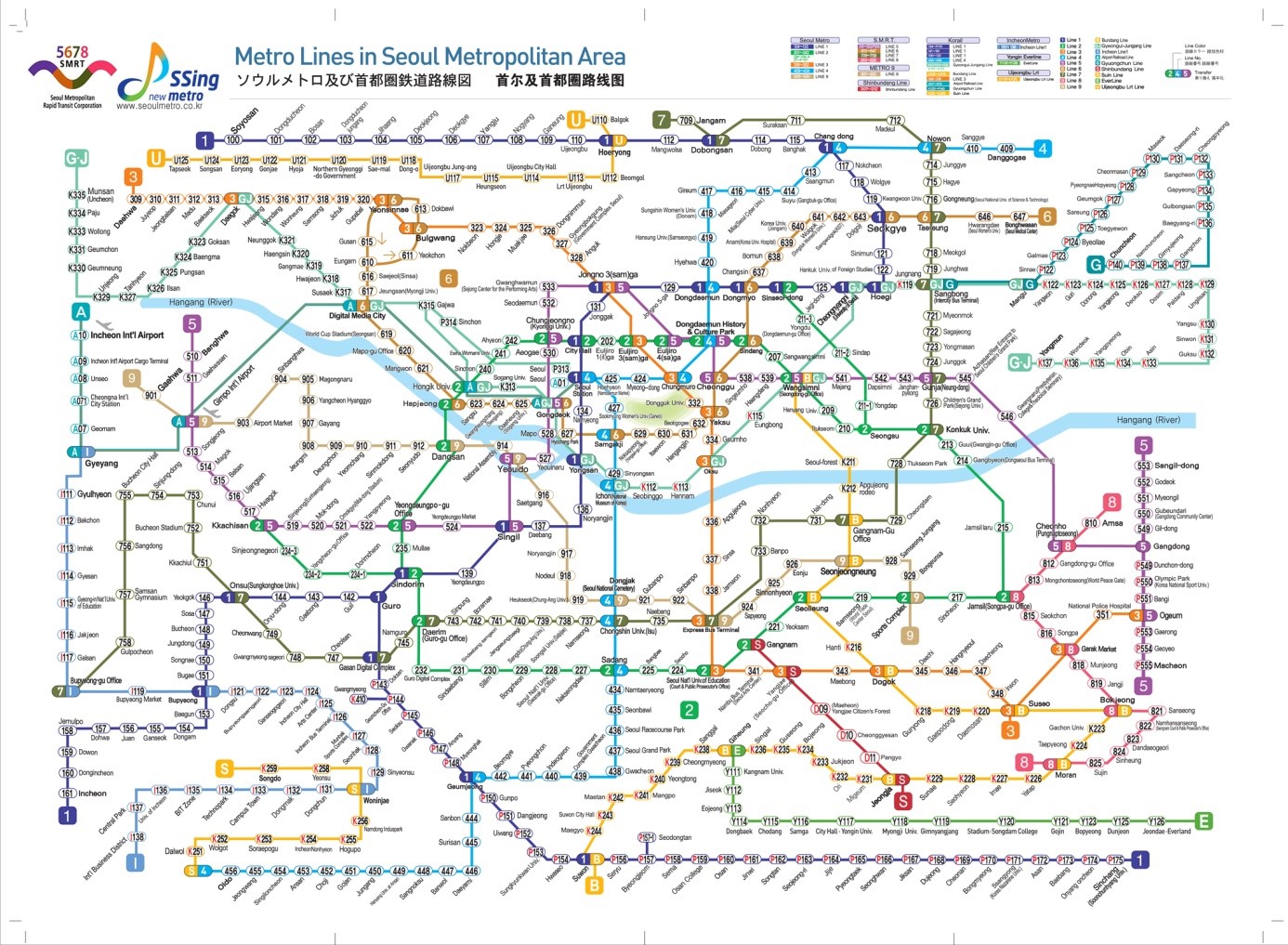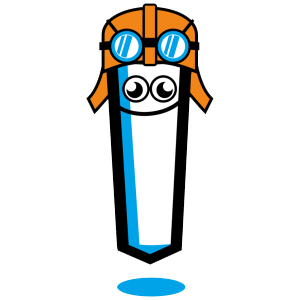Transportation:
Different modes of transportation include subway, bus, and train, amongst many others! The subway is the most convenient to get from one place to another. However, it is best to do some homework on studying the subway system before travelling as getting to one destination might require many transfers. Getting used to walking long distances is important too! In Korea, automobiles drive on the right while people usually walk up the stairs on the left.
The T-money transport card can be used for both the subway and buses in Seoul. It can also be used in other major cities like Busan. The student identification cards issued by Korean universities have the T-money function.
Subway

Seoul boasts one of Asia’s most comprehensive subway systems that allow commuters to get to most parts of the city without having to transfer to another mode of transport. Incheon, a city which is in close proximity to Seoul, gets to benefit from it as well. While it may be convenient, the complex network of subway lines may prove to be daunting for first-time visitors to the country.
Flying Chalks' recommendations: There are many free mobile applications that you can download to help navigate Seoul’s subway system.
- For Android users, you can download “Subway Korea” or “Korea, Seoul Metro Navi”.
- For IOS users, you can download “Subway Korea” or “Seoul City Metro Lite”.
- For those who can read and understand basic Korean, the highly popular “Daum Maps” can help you navigate around by recommending the fastest options via public bus and subway.
Basic fare for 10km: 1050 KRW (Transit card); 1150 KRW (Ticket)
Total distances exceeding 10 km (within Seoul): 100 won for each additional 5 km
Total distances exceeding 40 km (within Seoul): 100 won for each additional 10 km
Total distances exceeding 30 km (outside Seoul): 100 won for each additional 5 km
To begin your commuting journey, simply purchase a transit card (more commonly known as the T-money card) at any of the ticketing machines or from the metro office located at the stations.
Interactive subway map can be found here!
Local city bus
Apart from subway, buses are another convenient form of transportation. Fares can be paid either in cash or using a public transportation card (one which you use for taking the subway).
Express and Intercity bus
Express and Intercity buses are the most popular option to get region to region. The extensive network of buses offers a comfortable and convenient way to get to and from even the smallest towns in Korea.
For more information, you can visit:
http://english.visitkorea.or.kr/enu/TRP/TP_ENG_5_2.jsp
Rail
Another favoured option to travel between cities in Korea is by train.
Seoul is connected to the country’s other cities via train networks. Ticket prices depend on the distance travelled and the train classification. KTX trains offer high-speed travel with comfortable seating. For the budget conscious, there are cheaper options such as the Mugunghwa trains. Taking the train is a good way to experience travel in Korea and enjoy the special rail lunch box sets available at the train stations.
Click here for railroad map.
Click here for more details on the KR Pass.
Taxi
Taxis are plentiful, clean, safe, and affordable in Korea.
Taxi Fares (as of December 9, 2013)
Regular Taxis [mid-size] | |||
Basic fare | Region | Additional Fare | Details |
2,800-3,000won | Varies by region | Fare calculated by | In Seoul, Gyeonggi, Incheon and Busan, a surcharge of 20% applies during late-night hours (midnight-4am) and in suburbs (N/A for other cities). |
Deluxe and Jumbo Taxis | |||
Basic fare | Region | Additional Fare | Details |
3,200-5,000 won | Varies by region | Fare calculated by | There are no surcharges for |
Flying Chalks' tip: Deluxe taxis can be recognised by its signature black body with a yellow sign on the top. Avoid hailing these taxis should you not want to find yourself paying more than the usual for a ride.
Domestic flights
Ferries
Banking Services:
To set up a bank account, you will require:
- Valid passport
- Alien registration card (as proof of residency)
Once a bank account is open, the bank will issue a check card with ATM deposit / withdrawal functions (in Korean won). The time taken to issue check cards may vary by bank.
Flying Chalks’ tip: There’s a Woori Bank located on the first floor of the Faculty Office Building (HUFS Seoul campus)!
Major Banks in Korea:
Korea Exchange Bank (KEB)
Of all local commercial banks, Korea Exchange Bank (KEB) is the only one that offers foreigners-only bank accounts that record all transactions in English.
Procedures:
- Visit the nearest Korea Exchange Bank (KEB) branch
- Take a ticket from the queue ticket machine at the Foreign Exchange section and wait for your turn
- Proceed to the desk that displays your number
- Present your passport and alien registration card in order to open a bank account. Apply for a check card with ATM deposit / withdrawal functions
Opening hours: Hours: 09:00-16:00 (Monday-Friday; closed on holidays)
Their homepage is available here!
Customer Service: +82-2-3709-8080, 1544-3000
Hana Bank

Check cards with ATM deposit/withdrawal functions are issued on the spot. The Hana Bank World Centre branch in Jung-gu, Seoul offers consultation in English.
Opening hours: Hours: 09:00-16:00 (Monday-Friday; closed on holidays)
Their homepage is available here!
Customer Service: +82-2-520-2500, 1599-1111
Kookmin Bank (KB)

Check cards with ATM deposit/withdrawal functions are issued on the spot.
Opening hours: Hours: 09:00-16:00 (Monday-Friday; closed on holidays)
Their homepage is available here!
Customer Service: +82-2-6300-9999, 1599-9999
Shinhan Bank

ATM cards are issued on the spot while check cards are issued after three months of opening the bank account.
Opening hours: Hours: 09:00-16:00 (Monday-Friday; closed on holidays)
Their homepage is available here!
Customer Service (09:00-17:00): 1577-8380 (Extension: #1-English, #2-Japanese, #3-Chinese, #4- Vietnamese)
Woori Bank

You will be issued the check card and a bank book on the spot. There is no charge for opening the bank account as with most banks in Korea.
Customer Service (for foreigners): 1599-2288 (Extensions 1-7 for English, Chinese, Japanese, Vietnamese, Mongolian, Thai or Indonesian speaking service)
Post office Services:
There is a post office on campus, located on the 2nd floor of the Student Center.
Flying Chalks’ tip: Regular shipping will set you back about SGD $5 per kilogram of postage.
Medical services:
Inha Student Health Association Program
All undergraduate students including exchange students are required to be registered in Inha Student Health Association as a complementary measure. The fee is KRW $11,000 per semester.
For more information on the program and Inha University’s designated insurance plan, you can click here!
List of Hospitals and Pharmacies near the Campus
With Korea being a developed country, it may be surprising to foreigners that there is a lack of private clinics and most Koreans either go to hospitals or simply buy medicine from pharmacies to treat their illnesses.
Pharmacies are located all over the city and can be identified with a sign that reads, 약국 or "Yak". You can purchase both prescription and over-the-counter drugs for colds, headaches, and other minor ailments there.
(Hyundai Uvis Hospital/ Hospital) | 현대유비스병원 | ☎ 032-890-5640 |
(Choong-Ang Medical/ Hospital) | 중앙메디칼 | ☎ 032-866-0800 |
(Hak-Ik Orthopedics /Hospital) | 학익정형외과 | ☎ 032-868-5200 |
(Good Morning Dentist /Clinic) | 굿모닝치과 | ☎ 032-864-2875 |
(Coco Otolaryngology /Clinic) | 코코이비인후과 | ☎ 032-864-5075 |
(Sae-Som Rehabilitation Treatment /Clinic) | 새솜재활의학과 | ☎ 032-863-8855 |
(Hyun Dermatology and Urology /Clinic) | 현피부비뇨기과 | ☎ 032-862-0507 |
(Lee Kwang-Rae Internal Medicine /Clinic) | 이광래내과의원 | ☎ 032-876-1984 |
(Inha University Hospital/ General Hospital) | 인하대병원 | ☎ 032-890-2357 |
(Oh-Sung Pharmacy) | 오성약국 | ☎ 032-873-3280 |
(Ko-Il Pharmacy) | 고일약국 | ☎ 032-862-8275 |
(Da-Sarang Pharmacy) | 다사랑약국 | ☎ 032-862-1494 |
(Inha Pharmacy) | 인하약국 | ☎ 032-889-1580 |
Telecommunications:
There are 3 mobile telecommunications service providers in Korea: KT, SKT, and LG U+. These providers operate authorized service centres and phone retail stores called 공식 인증 대리점 (gongsik injeung daerijeom), where you can subscribe to a phone service and purchase a mobile phone. An authorized store should carry the logo of its parent company as well as a sign that says “공식 인증 대리점.”
KT
KT operates authorized stores with signs that read “Olleh”. The most representative KT center, located in Gwanghwamun offers consultation in 17 different languages.
SK Telecom
SK Telecom operates authorized stores with signs that read “T World” or “SK Telecom” as well as a customer call center exclusively for foreigners. You can call the customer center to find out which stores provide interpretation services as not all of them do.
LG U+
LG U+ operates authorized stores with signs that read “LG U+”.
Weather:
Korea’s climate is characterized by 4 distinct seasons: spring, summer, fall, and winter.
Spring
Lasts from late March to May, and is signalled by the picturesque sight of cherry blossoms blooming all over the country.
Summer
Lasts from June to early September. It is a hot and humid time of the year where temperatures can soar above 30 °C in some areas.
Autumn
Lasts from September to November. It is generally regarded as the best season to visit Korea with its cool temperatures and scenic autumn foliage.
Winter
Lasts from December to mid-March, where temperatures can plunge to as low as −20 °C in some areas.
IMPORTANT NUMBERS | |
General nationwide emergency hotline that can be used to call for an ambulance, fire truck or police | 119 |
Police | 112 |
BBB (Before Babel Brigade) can be dialed if you are having difficulty communicating in Korea. It has 2,400 volunteers fluent with 17 foreign languages who will help you with translation problems whenever and wherever via mobile phone. | 1588-5644 |
Tourist Complaint Centre | 02-735-0101 |



